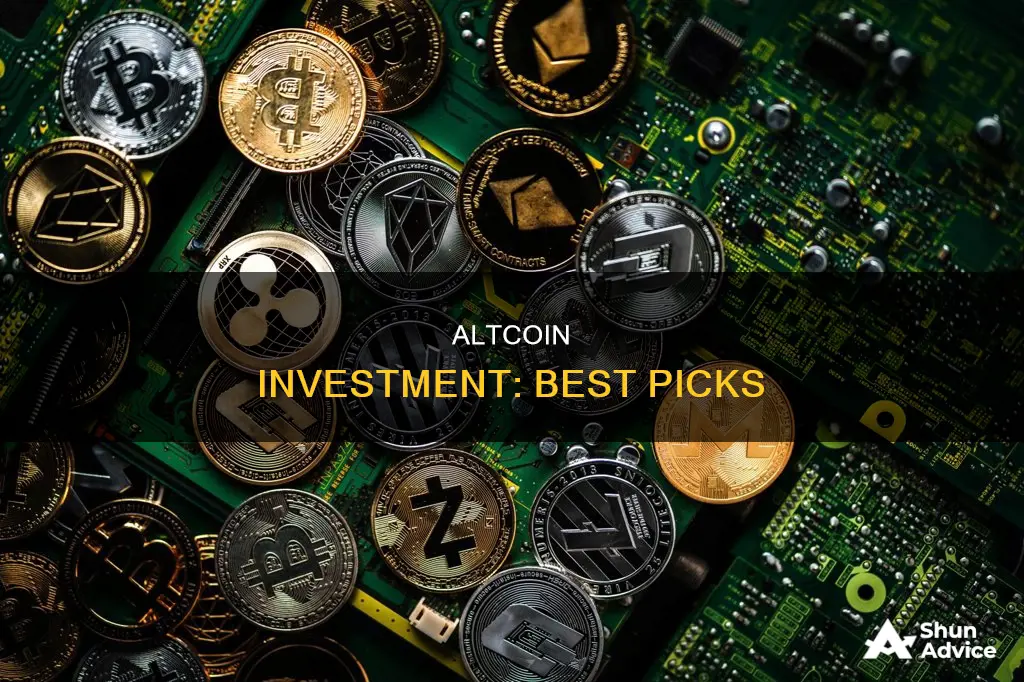
With the crypto market in a constant state of flux, investors are always on the lookout for the next big thing. Altcoins – any cryptocurrency that isn't bitcoin – are an increasingly attractive prospect for those looking to diversify their portfolios.
Ethereum is the most valuable altcoin on the market, with a market cap of over $400 billion. Its popularity stems from its functionality, with its blockchain the first to introduce smart contracts, and its greener, more scalable network.
Other altcoins to watch include BNB, which can be used for a wide range of transactions, and Solana, which is faster and cheaper than the Ethereum network.
For those looking to invest, it's important to do your research, assess the risk, and only invest what you can afford to lose.
What You'll Learn

Ethereum's innovative technology
Ethereum is a decentralized blockchain with smart contract functionality. It is open-source software that allows anyone to deploy permanent and immutable decentralized applications. Ethereum's blockchain technology is innovative in several ways:
Decentralized Applications
Ethereum allows anyone to deploy permanent and immutable decentralized applications (dApps) onto it, enabling users to interact with financial instruments that do not directly rely on intermediaries like banks or brokerages. This facilitates borrowing against or lending cryptocurrency holdings.
Non-Fungible Tokens (NFTs)
Ethereum also allows users to create and exchange non-fungible tokens (NFTs), which are unique digital assets tied to images, sports memorabilia, virtual real estate, etc.
Smart Contracts
Ethereum enables the creation of smart contracts, which are self-executing contracts that can be programmed to automatically trigger actions based on predetermined conditions. This allows for the development of decentralized autonomous organizations (DAOs) and decentralized finance (DeFi) applications.
Consensus Mechanism
On 15 September 2022, Ethereum transitioned its consensus mechanism from proof-of-work (PoW) to proof-of-stake (PoS) in an upgrade known as "the Merge". This reduced Ethereum's energy usage by 99%.
Scalability and Interoperability
Ethereum 2.0 aims to address the issue of scalability by implementing sharding, which divides the network into smaller, interconnected chains, each processing a portion of the transactions. Additionally, Ethereum's layer 2 solutions, such as Polygon, aim to improve scalability and transaction speed without compromising security.
Privacy and Regulatory Compliance
Ethereum co-founder Vitalik Buterin has proposed the concept of "privacy pools," a technological feature that would enhance user privacy while separating criminal activity from innocent transactions. This approach aims to address regulatory concerns and provide a balance between privacy and compliance.
Investing: Control, Returns, and Excitement
You may want to see also

Polkadot's multi-chain framework
Polkadot is a multi-chain framework that connects and supports a network of heterogeneous blockchains, known as parachains and parathreads. These chains are linked to and secured by the Polkadot Relay Chain, which acts as the heart of the network, ensuring shared security, consensus, and cross-chain interoperability.
The Relay Chain is responsible for processing transactions from all chains within the network simultaneously, eliminating bottlenecks and significantly enhancing scalability. This parallel processing capability is why the blockchains on Polkadot are termed parachains (short for parallelized chains). Each parachain is a sovereign blockchain with its own unique characteristics, tokens, and governance mechanisms. They are designed to address specific use cases, such as gaming or NFT trading, allowing for optimization and specialization within the Polkadot ecosystem.
The Polkadot network utilizes a Nominated Proof-of-Stake (NPoS) consensus mechanism to maximize chain security and decentralization. Validators stake DOT, the native token of Polkadot, to confirm and secure transactions, produce new blocks, and ensure transaction finality. DOT token holders can participate as Nominators by backing specific validators with their stakes.
Polkadot also introduces the concept of parathreads, which are similar to parachains but operate on a pay-as-you-go model. Parathreads are more economical for blockchains that do not require continuous connectivity to the network. The network can accommodate up to 10,000 parathreads, providing the same level of security and interoperability as parachains.
Additionally, Polkadot's cross-chain messaging scheme, known as XCM, enables the exchange of any type of data, allowing for true interoperability and the creation of interchain services, communities, and economies. This flexibility empowers developers to leverage the features and offerings of multiple blockchains, enhancing scalability and efficiency.
In summary, Polkadot's multi-chain framework provides a decentralized ecosystem for blockchains, facilitating seamless interoperability, improved scalability, enhanced security, and specialized use cases. Its innovative design addresses the challenges of the blockchain trilemma and enables the development of a wide range of applications, making it a compelling altcoin investment opportunity.
Insurance: A Safe Investment Bet?
You may want to see also

Algorand's Pure Proof of Stake protocol
Algorand's Pure Proof-of-Stake Protocol
Algorand's Pure Proof-of-Stake (PPoS) protocol is built on Byzantine consensus, a decentralized agreement protocol that leverages pure proof of stake. This means it can tolerate malicious users and achieve consensus without a central authority, as long as a supermajority of the stake is in non-malicious hands.
The PPoS protocol is designed to be fast and efficient, requiring minimal computational power per node. It randomly and secretly selects users to propose blocks and vote on block proposals, with each user's influence proportional to their stake in the system. This ties the security of the economy to the honesty of the majority, making it impossible for a small group of users to harm the system.
Advantages Over Proof-of-Work
Algorand's PPoS has several advantages over the traditional Proof-of-Work (PoW) protocol. PoW is expensive and wasteful, requiring specialized hardware and large amounts of electricity, which leads to centralization as miners pool their resources. Algorand's PPoS, on the other hand, is accessible to any online user with a stake, and block generation does not require expensive computation.
Additionally, PoW systems are slow and lack scalability due to the time it takes to propagate blocks to the network, whereas Algorand's low computation and communication overhead allows blocks to be propagated within seconds, making it scalable to millions of users.
Advantages Over Delegated Proof-of-Stake
Algorand's PPoS also has benefits when compared to the Delegated Proof-of-Stake (DPoS) protocol. In DPoS, a small set of users are in charge of block generation, which leads to centralization and insecurity. Algorand's PPoS, however, does not require users to delegate their voting power, and every user can propose and vote on blocks directly, leaving no special group for attackers to target.
Advantages Over Bonded Proof-of-Stake
Finally, Algorand's PPoS has advantages over the Bonded Proof-of-Stake (BPoS) protocol. In BPoS, users must set aside part of their stake to participate, reducing their ability to spend their stake. Algorand's PPoS does not require this, and users are free to spend their stake at any time, with no stake ever being held hostage.
In conclusion, Algorand's Pure Proof-of-Stake protocol offers a highly efficient, secure, and decentralized alternative to other consensus protocols, making it an attractive prospect for investment.
REITs: Invest Now or Later?
You may want to see also

Uniswap's decentralised exchange
Uniswap is a decentralised exchange (DEX) that operates on the Ethereum blockchain. It allows users to trade crypto without an intermediary, making it a peer-to-peer platform. The Uniswap Protocol is the largest decentralised exchange for swapping cryptocurrency tokens on Ethereum and other popular blockchains. It was launched in 2018 and is the world's largest and most popular decentralised exchange, with over $1.8 trillion in trading volume and 350 million swaps.
The Uniswap Protocol is a decentralised marketplace to swap cryptocurrencies on the Ethereum blockchain. It exists as a set of persistent, non-upgradable smart contracts. That means that no one controls the codebase, and the code cannot be changed or modified. The Uniswap Protocol will continue to run as long as the blockchain is functional, even if Uniswap Labs, the company that develops software products that work on top of the Uniswap Protocol, disappears.
The Uniswap Protocol is governed by UNI token holders and stewarded by the Uniswap Foundation. UNI is the governance token that allows users to vote on key protocol changes. It was the fourth-largest cryptocurrency by market cap on Coinbase as of April 2021, with a total value of more than $18 billion.
Uniswap has four versions, with the current version, Uniswap v3, introducing concentrated liquidity. This allows liquidity providers to choose specific price ranges rather than providing liquidity across the entire price range, allowing for more efficient capital allocation.
Uniswap offers several benefits over traditional centralised exchanges, including decentralisation, self-custody, transparency, improved liquidity, and greater accessibility. It is a safe platform as funds are never transferred to any third party or generally subject to counterparty risk. It is also global and permissionless, with no restrictions on who can trade. Users do not need to sign up for an account or provide personal details to use the platform.
To use Uniswap, users need an Ethereum wallet, such as Coinbase Wallet, and a bit of ETH to pay for gas fees. Users can then access app.uniswap.org to start swapping tokens or supplying liquidity.
US Investment Trends: Where's the Money?
You may want to see also

Chainlink's decentralised oracle network
Chainlink is a decentralised oracle network that provides real-world data to smart contracts on the blockchain. Smart contracts are pre-specified agreements on the blockchain that evaluate information and automatically execute when certain conditions are met.
In summary, Chainlink's decentralised oracle network is a critical component in enabling smart contracts to securely interact with real-world data. By addressing the blockchain oracle problem, Chainlink has helped to scale blockchain technology and create the verifiable web, making it a potentially attractive altcoin investment opportunity.
GME: The People's Investment
You may want to see also
Frequently asked questions
As of July 2024, the top three altcoins to invest in are Ethereum (ETH), Solana (SOL), and Chainlink (LINK).
Ethereum is a robust computer network that allows people to build things on top of it, like apps and smart contracts. It is also the second-biggest cryptocurrency by market value and has overcome challenges in the past, showcasing its staying power.
Other altcoins with high growth potential include Polkadot (DOT), Polygon (MATIC), Cardano (ADA), and Ripple (XRP).







